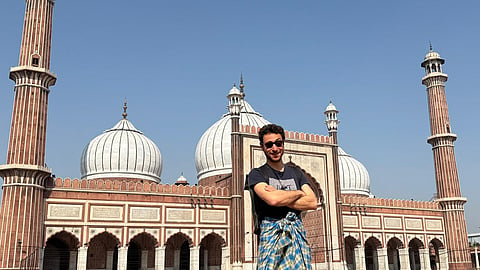

Being funny is tough, but being funny in a second language in a different country is even tougher—something Franco-American comedian Sebastian Marx has mastered. “Comedy is already hard, but starting from scratch in another country and performing in a different language? That’s a whole other challenge,” he jokes speaking to TMS at an event organised by the Alliance Francaise in Delhi.
Born and raised in the US, Marx was immersed in stand-up—a staple of American culture. “I watched a lot of comedians, like Jerry Seinfeld and Chris Rock on TV growing up,” he recalls. He began performing at 17 at a New York comedy club, and also took stand-up classes in Manhattan that ignited his passion. After falling in love with a French woman, he moved to France in 2005.
France and career
Marx moved to France with the no intention of continuing his stand-up career. “I thought I’d have to stop because I didn’t speak the language—you kind of need that for stand-up comedy. But as my French improved, I started missing the stage. I thought, why not give it a shot in French?” He began with one-man shows and appeared on the fifth season of Jamel Comedy Club, a show instrumental in popularising stand-up comedy in the country. “It was my first real filmed set, and I was extremely nervous,” he recalls. “But it was a great experience, even though the pressure was intense, knowing millions would watch.”
Over the years, he has performed across various countries in both French and English, expanding his career beyond France and the US. Marx is best known for ‘Un New Yorkais à Paris’ (A New Yorker in Paris) and ‘On est bien là’ (We’re Good Here). His performance is witty, blending punchlines and wordplay on the French language, culture, parenthood, and daily life in France.
French vs American audience
Stand-up culture in the US and France is quite different. “In the US, comedy shows are primarily in dedicated comedy clubs, while in France, they’re often in theatres,” he explains. However, with the rise of comedy clubs in Paris, the culture is evolving. Audience interaction is another key contrast. “Americans are more willing to participate. If a comedian asks a question, 10 people will answer. In France, you have to work to get a response.”
Comedy is deeply tied to language and culture. “Some jokes fail simply because the audience doesn’t share the same cultural context,” Marx explains. For example, he jokes about his French wife smoking a lot. “In English, the joke works because the stereotype is that French people smoke. But in France, they don’t think they smoke a lot—they think Americans do because of Marlboro ads and cowboy imagery.”
Despite his fluency, English remains his comfort zone. “In English, I can go on stage with just a vague idea and figure it out as I go. In French, I still need to write everything out,” he explains. Marx relies on his wife to refine his material. “I need a funny French person’s help,” he laughs. “She corrects my script from a linguistic perspective.”
Performing in India
His debut show in Delhi drew a diverse crowd. “Performing as an American living in France, in French, to a mix of French expats and Indian students, finding common ground was tricky,” he admits.
Marx adapts his comedy by finding universal experiences that resonate with diverse audiences. “I knew that talking about India was important because, no matter who’s in the audience—French expats, Indian students, or me as an American—we’re all here. We all experience the same things, like people honking on the streets.” He explains that some of his jokes rely on specific French cultural references. “I might talk about certain shops in France or how you buy train tickets there. Even if an Indian student learning French understands the language, they might not get the reference. That’s the tricky part—stand-up isn’t just about words, it’s about shared experiences."
For his performance in India, Marx arrived with cinematic expectations. “I was expecting Old Delhi, with goats on the street,” he laughs. “But India is everything and its contrary—extremely modern yet deeply rooted in the past. It spans three centuries at once. You cross one street, and you’re in the 19th century, then another, and it’s the 21st.” Visiting new countries is a personal tradition for Marx. “India has been on my list for a long time, and I’m thrilled to finally be here.”
Discussing red flags in comedy, Marx emphasises that failure is essential. “If a comedian says, ‘I've never bombed,’ that’s a red flag. No one is great all the time. Even the best comedians have off nights.”
On political correctness, he acknowledges the fine balance comedians must navigate. “Some comedians want to be politically correct, while others take the extreme opposite approach, saying, ‘I don’t care about what anybody says.’ I think both are dangerous.” Marx admits he struggles with the balance between pushing boundaries and offending audiences. “Some comedians love shocking audiences, but that’s not my thing. I like it when they’re a little surprised but still laughing. That’s the sweet spot.”